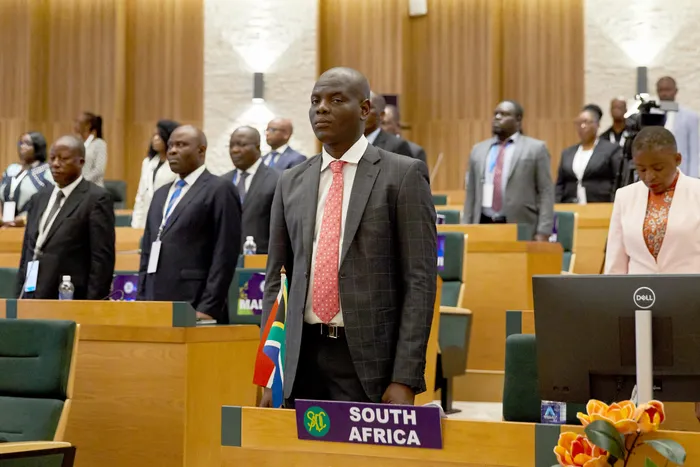Public service in Southern Africa: A New era of collaboration and accountability

South Africa Minister of Foreign Affairs Ronald Lamola (C) is seen during the joint meeting of the Southern African Development Community (SADC) and the East African Community Ministers on the Democratic Republic of Congo conflict held in Harare, on March 17 2025.
Image: AFP
In Windhoek, delegates from ten Southern African Development Community (SADC) member states gathered for the SADC Public Service Commissions (PSCs) Forum, marking a pivotal moment for statecraft in the region. This forum, with participation from nations such as South Africa, Angola, Zimbabwe, and Mauritius, underscores a pressing dedication to redefine the core of public administration across Southern Africa. The consensus is clear: the existing bureaucratic framework, characterised by inefficiency, patronage, and stagnation, must evolve into a contemporary, ethical, and development-oriented public service.A New Vision for Public ServantsProfessor Somadoda Fikeni, Chairperson of South Africa’s Public Service Commission, has articulated a bold and much-needed vision for a "new type of public servant." This reimagining calls for public servants to be more than mere functionaries; they must be active drivers of social transformation, characterised by their ethical conduct, technical proficiency, social consciousness, and development-oriented approach. This visionary perspective is long overdue.
Challenges Undermining Governance
Uneven public service delivery persists across the SADC region, marked by corruption, politicisation, a lack of accountability, and insufficient investment in human capital. Transparency International's 2024 Corruption Perceptions Index reveals that seven of the ten forum-participating countries score below 50 out of 100, signifying severe systemic governance challenges. For instance, public trust in Zimbabwe's government services remains critically low due to widespread mismanagement, particularly in vital sectors like health and education. Conversely, Mauritius, with a score of 53, exemplifies how ethical governance and a commitment to public service excellence can foster stability and sustainable growth.Fikeni’s advocacy for a revitalised public service is not mere theoretical discourse; it directly addresses systemic issues that have historically impeded progress. The Southern African region experiences some of the world's most severe rates of unemployment and inequality. South Africa, the continent's leading industrialised nation, for instance, reported a striking youth unemployment rate of 46,1% in Q1 2025, according to Stats SA. In such a climate, an efficient public service is not merely advantageous but is fundamental to economic revitalisation, equitable development, and maintaining democratic integrity.
The Case for Regional Cooperation
The upcoming forum in Windhoek offers a crucial opportunity to transcend the historical siloing of SADC states in civil service reform, fostering greater cross-border collaboration and policy harmonisation. Regional cooperation is pivotal for accelerating policy learning and consolidating limited institutional capacity. For example, Botswana's significant progress in digitising public services, notably its Integrated Public Service Portal, led to a 30% reduction in administrative delays in 2023. This success provides a scalable framework for nations such as Malawi and Lesotho, where digital integration in governance is still in its nascent stages.Coordinated strategies are essential for addressing cross-border challenges like migration, climate change, and transnational corruption. For example, Zambia and Zimbabwe frequently encounter coordination issues in the management of shared water resources and infrastructure projects within the Zambezi basin. Such inefficiencies could be resolved through a regional public service framework that prioritizes joint training, shared data platforms, and interoperable regulations.
Building Capacity for the Future
Fikeni’s focus on a “moral compass” is particularly relevant in a region plagued by widespread ethical failures within its civil service. However, ethics alone will not suffice. Tomorrow's public servant must also possess technical expertise and strategic foresight. As AI, climate resilience, and digital transformation reshape governance, traditional bureaucratic models are becoming outdated.To achieve the African Union’s Agenda 2063 and realise the vision of the African Continental Free Trade Area (AfCFTA), a digitally literate, policy-agile, and globally competitive public workforce is essential. The current skills gap is a critical concern: as of 2024, only 19% of public servants in SADC countries have received formal training in data analysis or e-governance, according to the African Capacity Building Foundation. Addressing this deficit is not merely an option; it is fundamental to Africa's future.To prevent the Windhoek forum from being merely a ceremonial summit, its outcomes must incorporate concrete mechanisms. Firstly, a regional public service observatory should be created to monitor reforms, assess service delivery benchmarks, and release annual progress reports. Secondly, a common code of ethics, consistent with the African Charter on the Values and Principles of Public Service and Administration, ought to be implemented across SADC states. Thirdly, it is crucial to invest in regional public administration schools, emphasising ethical leadership, data governance, and policy innovation.South Africa, with its rich resources and experience in complex governance reforms, can play a pivotal role. However, distributed leadership is key, with smaller states such as Mauritius and Botswana contributing their best practices and institutional models.
The SADC PSCs forum arrives at a critical moment. Southern Africa faces increasing socio-economic challenges, making a capable, ethical, and forward-thinking public service an urgent and essential requirement. It is time for the region to prioritise investment in its governance personnel, rather than solely focusing on policy implementation. This is the only path to achieving a genuinely developmental state that serves its citizens instead of ruling over them.
The discussions in Windhoek should not conclude the dialogue, but rather initiate a broader movement.